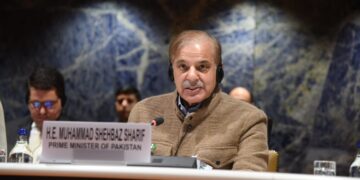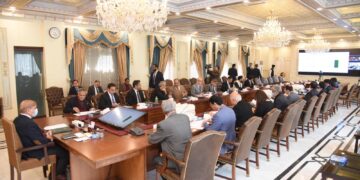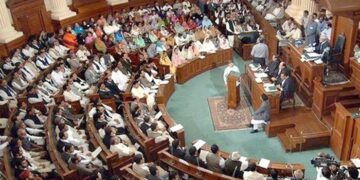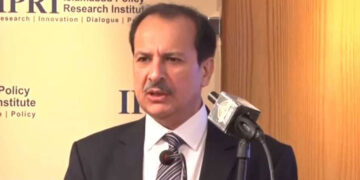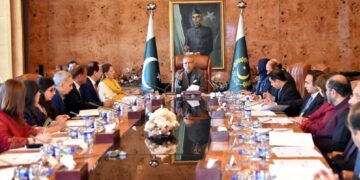Today, at 4 p.m., the National Assembly will convene for a key session in which the no-confidence resolution against Prime Minister Imran Khan will be debated.
Shehbaz Sharif, the Leader of the Opposition in the National Assembly, presented the motion against the besieged premier on March 28 and it was accepted for debate the same day.
The debate on the no-trust motion against the Prime Minister is listed as the fourth item on the session’s 24-point agenda.
Prime Minister Imran Khan had decided to present a’secret letter’ — purportedly containing details of a “foreign conspiracy” to topple his government — during an in-camera session of the NA or a joint session of parliament, Information Minister Fawad Chaudhry said yesterday, but no date for such a session was given.
After learning the contents of the claimed letter, the premier expects that his party’s dissidents, as well as frustrated friends, will change their minds and vote in favour of the no-trust resolution.
Despite being invited, the premier shared the letter with cabinet members in a hastily arranged meeting yesterday. Its two biggest allies, the Muttahida Qaumi Movement-Pakistan (MQM-P) and the Balochistan Awami Party (BAP), were not present.
The prime minister also contacted a group of TV anchors and told them that “the language of the letter was menacing and arrogant” and that if the no-confidence motion failed, Pakistan would face terrible repercussions.
At 6 p.m., a parliamentary committee will meet.
Following the prime minister’s decision to present the letter to lawmakers, National Assembly Speaker Asad Qaiser called a meeting of the Parliamentary Committee on National Security for 6 p.m. on Thursday.
The conference will be presided over by the speaker, and leaders of all parliamentary parties have been invited, according to a statement from the National Assembly Secretariat.
According to the statement, “a briefing on the secret letter will be presented during the national security committee meeting.”
Sherry urges people to vote today.
Meanwhile, PPP Senator Sherry Rehman stated on Thursday that the NA speaker had no “constitutional” or “moral” reason to postpone the no-trust vote, and urged that it be held today.
She said that Imran Khan’s “manufactured” majority had suddenly become a minority in a series of tweets. “Today will be the last day of Imran Khan’s chosen administration if the no-confidence vote is held. What kind of invisible assistance is Imran Khan looking for?”
Sheikh Rashid, the federal Interior Minister, announced earlier this week that the vote on the no-confidence resolution would take place on April 3.
Rehman said in her tweets today that the government’s “sinking ship” was utilising the alleged “secret letter” to leave.
“Imran Khan should not have retained the position of Prime Minister for a single day after the MQM, BAP, Jamhoori Watan Party, and independent lawmakers joined the opposition alliance,” she tweeted, adding that the prime minister should quit.
The opposition currently has the upper hand.
The Muttahida Qaumi Movement-Pakistan (MQM-P), which had previously been a crucial supporter of the PTI-led coalition government, had publicly announced its decision to join the opposition ranks the day before.
Following the withdrawal of the seven-member MQM-P, the opposition parties have now crossed the magical number of 172 — the number required to form a government at the Centre — and now have 177 members in the National Assembly, despite the fact that nearly a dozen dissidents from the ruling PTI had already publicly declared their support for the prime minister.
“The previous assembly had 26 seats. These were whittled down to seven during the planning stages. But now we’ve demonstrated that without these seven seats, no government can be established or ousted “MQM-P convener Dr Khalid Maqbool Siddiqui made the formal announcement of the party’s decision, which he noted had been backed by the Rabita Committee, the party’s decision-making body.
Delay in putting a resolution on the table
On March 8, a team of prominent opposition legislators presented the National Assembly Secretariat with a no-trust motion against the premier.
According to the norms and procedures of the assembly, a resolution “must not be voted upon before the expiration of three days, or later than seven days” after it is moved.
The no-trust motion against the prime minister was scheduled to be introduced on March 25, but it was postponed after the NA speaker abruptly terminated the meeting and refused Opposition Leader Shehbaz Sharif’s request for the floor to make a remark.
After offering fateha for the deceased PTI MNA from Hangu, Khayal Zaman, he refused to allow the opposition’s no-trust resolution to be tabled, as is customary in parliament. When a member of the lower house died, the agenda was deferred to the next day, according to tradition, according to Qaiser.
Later, the opposition slammed the speaker for not giving Shehbaz the floor, claiming that it was a legislative custom that the opposition leader be given the floor anytime he rose to speak.
No Pakistani prime leader has ever served a full term, and Prime Minister Imran Khan is facing the most serious threat to his rule since his election in 2018, with critics accusing him of economic incompetence and foreign policy blunders.
Following an upset in Senate elections last March, the premier voluntarily sought a trust vote. In a display of strength, he received 178 votes — six more than was required — to win the National Assembly’s vote of confidence.
